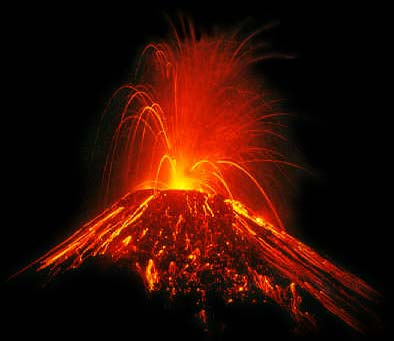All hell is about to break loose, but Udi, a 60-year-old farmer from the village of Kinarejo on the Indonesian island of Java, will not budge. Not even though a mere three miles (five kilometers) separates the smoldering peak of Mount Merapi from Kinarejo. Not even though columns of noxious gas and the nervous tracings of seismographs signal an imminent explosion.

Mount Merapi, Magelang, Central java
Not even though the government has ordered a full-scale evacuation. "I feel safe here," he says. "If the Gatekeeper won't move, then neither will I." Merapi is a natural-born killer. Rising almost 10,000 feet (3,000 meters) over forests and fields, it ranks among the world's most active and dangerous volcanoes. Its very name means "fire mountain." An eruption in 1930 killed more than 1,300; even in less deadly times, plumes drift menacingly from the peak.
Merapi
Some of the surrounding area, warns a local hazards map, is "frequently affected by pyroclastic flows, lava flows, rockfalls, toxic gases and glowing ejected rock fragments." As the volcano's rumbling crescendoed in May 2006, thousands fled the fertile slopes and settled reluctantly into makeshift camps at lower, safer altitudes.
Merapi's Lava
Even the resident monkeys descended in droves. Not Udi and his fellow villagers, who take their cues from an octogenarian with dazzling dentures and a taste for menthol cigarettes: Mbah Marijan, the Gatekeeper of Merapi. Mbah Marijan has one of the more bizarre jobs in Indonesia, or anywhere else, for that matter. The fate of villagers like Udi and of the 500,000 residents of Yogyakarta, a city 20 miles (32 kilometers) to the south, rests on Marijan's thin shoulders.It is his responsibility to perform the rituals designed to appease an ogre believed to inhabit Merapi's summit. This time, the rituals seem to have fallen short. The warnings grow more urgent. Volcanologists, military commanders, even Indonesia's vice president beg him to evacuate. He flatly refuses in javanese. "kuwi pancen tugasmu ngandani aku (It's your duty to come talk to me,)" he tells the police. "iki tugasku kanggo tetep nang kene (It is my duty to stay.)"
Andrew Marshall from National Geographic



